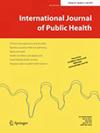沙特阿拉伯婚前筛查人群中的乙型肝炎病毒、丙型肝炎病毒和人类免疫缺陷病毒感染情况。
IF 2.6
3区 医学
Q2 PUBLIC, ENVIRONMENTAL & OCCUPATIONAL HEALTH
引用次数: 0
摘要
目的 婚前筛查是在人群中预防乙型肝炎病毒、丙型肝炎病毒和人类免疫缺陷病毒等传染病的最重要策略之一。本研究旨在探讨沙特阿拉伯接受婚前筛查的人群中这些病毒的流行情况及其与潜在人口学因素之间的关联。方法采用横断面研究设计,使用沙特卫生部的国家健康婚姻计划电子登记册。患者从三种血液传播病毒的婚前筛查中选出。结果乙肝病毒感染率最高,其次是丙肝和人类免疫缺陷病毒。在感染者中,男性的感染率高于女性。结论所研究的感染在沙特阿拉伯婚前筛查人群中构成了一个持续的公共卫生问题。这项研究确定了这些疾病的重要人口风险因素,并强调了在国家层面制定未来战略和长期计划的必要性。本文章由计算机程序翻译,如有差异,请以英文原文为准。
Hepatitis B Virus, Hepatitis C Virus, and Human Immunodeficiency Virus Infection Among Premarital Screening Individuals in Saudi Arabia.
Objective
Premarital screening is one of the most important strategies for preventing infectious diseases such as hepatitis B virus, hepatitis C virus, and human immunodeficiency virus in populations. This study aims to explore the prevalence of these viruses and their association with potential demographic factors among individuals undergoing premarital screening in Saudi Arabia.
Methods
A cross-sectional study design using the National Healthy Marriage Program electronic registry in the Saudi Ministry of Health. Patients were selected from the premarital screening tests for the three blood-borne viruses. Data were obtained from January to August 2021 among 114,740 individuals.
Results
Hepatitis B virus infection showed the highest prevalence followed by hepatitis C and human immunodeficiency viruses. Among those who were infected, men had higher infectious disease prevalence than women. The central and western regions had the highest percentages of infection.
Conclusion
The studied infections pose a continuous public health issue among premarital screening individuals in Saudi Arabia. This study identified important demographic risk factors for these diseases and highlighted the need for future strategies and long-term plans at the national level.
求助全文
通过发布文献求助,成功后即可免费获取论文全文。
去求助
来源期刊

International Journal of Public Health
医学-公共卫生、环境卫生与职业卫生
CiteScore
4.20
自引率
2.20%
发文量
269
审稿时长
12 months
期刊介绍:
The International Journal of Public Health publishes scientific articles relevant to global public health, from different countries and cultures, and assembles them into issues that raise awareness and understanding of public health problems and solutions. The Journal welcomes submissions of original research, critical and relevant reviews, methodological papers and manuscripts that emphasize theoretical content. IJPH sometimes publishes commentaries and opinions. Special issues highlight key areas of current research. The Editorial Board''s mission is to provide a thoughtful forum for contemporary issues and challenges in global public health research and practice.
 求助内容:
求助内容: 应助结果提醒方式:
应助结果提醒方式:


